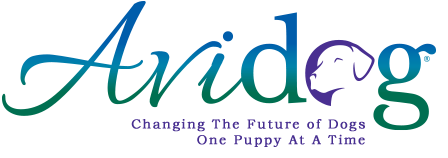Puppy Enrichment
& Socialization
Puppy Culture is a comprehensive program created by, Jane Killion, for breeders and owners to follow from rearing through early socialization. It focuses on learning experiences and training techniques for puppies that optimizes their physical and mental development. Puppy Culture is a holistic approach to raising puppies and utilizes the latest scientific research from top veterinary behaviorists, breeders, and dog trainers. It provides puppies with the foundation to help them grow into confident, well-adjusted adult dogs.
Avidog provides education for dog breeders using ethical breeding practices and puppy rearing-methods to produce healthier, more stable puppies. Avidog was founded by Golden Retriever breeder, researcher and teacher, Gayle Watkins, PhD. Avidog’s curriculum includes training and socialization from birth through adolescence and into adulthood.
Prenatal: Before Birth Period
The physical and emotional health of the dam impacts the health of her puppies. During this period, we give our mama the best nutrition, belly rubs, and lots of affection, relieving stress and pregnancy discomforts. Even before the litter is born, the puppies exposed to human touch are more likely to develop gentle dispositions.
Neonatal Period: 1 - 2 Weeks
During the Neonatal period, the puppies are nurtured by mom and loved-on by our family. We begin Early Neurological Stimulation (ENS) and Early Scent Introduction (ESI) with the puppies from days 3-16. This is performed during the puppy’s early development and has been shown to increase their immune system functions and create positive association with being handled. ENS involves performing a series of five exercises on each puppy, engaging in tactile and thermal stimulation, and holding the puppy in various positions. In addition, we introduce the puppies to a variety of smells early on to enhance their ability to recognize and react to experiences. A dog’s ability to smell is how they see and understand the world around them. These exercises used during their early development have a lifelong impact on their health and stability.
Benefits of Early Neurological Stimulation
Improved Cardiovascular performance and heartbeats
Better tolerance to stress and developing coping mechanisms
Stronger adrenal glands
Greater resistance to disease
Benefits of Early Scent Introduction
Improves scent ability later in life
Increase confidence and ability to adjust to situations
Reduce behavioral issues
Transitional Period: 2 - 3 Weeks
The Transitional period begins when the puppies open their eyes at around 12 - 14 days and ends when they first startle upon hearing a sound. During this period, the puppies are more mobile and start interacting with their littermates as their individual personalities begin to emerge. At this time, we introduce large soft toys and objects into the whelping box daily. A potty area is established in their whelping area as they learn how to pee on their own. We also separate each puppy from the litter one at a time for 5-10 minutes and start grooming by clipping their nails at least once a week. The puppies start to lap liquids so we begin introducing soft foods. Our puppies are raw weaned with lean muscle meats and warm goat’s milk. The goat’s milk is highly digestible and consists of the perfect balance of vitamins, minerals, amino acids, enzymes, proteins and nutrients essential for life.
The Socialization Period : 3 - 12 Weeks
The critical Socialization period from 3 - 12 weeks is a biologically determined period of their development that is optimal to form their attitudes and behaviors. This is a magical time where the puppies are curious and easy to socialize to new experiences with minimal fear. Their brain is a sponge and is ready to take in information. The puppies can see, hear, and have all of their senses to be able to be effectively socialized. This sensitive period ends when their brain begins to program and they become more cautious and less accepting of new things they have not experienced. We are no longer able to socialize puppies past this special 12 weeks because their brain chemistry is so different. We can use counterconditioning and desensitization training past 12 weeks, but it is a more challenging process to teach them that things are safe. This is why the Socialization period is so important!
Puppies learn to be dogs through socialization - it is “the complex process by which the puppy gains the knowledge and skills he needs to take his place in society and form the social and emotional bonds that define all of us, dog and human alike“ (Puppy Culture, 2014). Socialization is much more than exposing them to as many new experiences as possible. We strive to raise dogs who have the emotional intelligence to connect with you and form deeper relationships.
Puppy Culture teaches breeders and owners how to nurture the emotional intelligence of a puppy with 7 key components that define the human-animal bond:
Communication - dog and human language skills
Emotional Stability - ability to recover easily from fear as well as cope with stress and frustration in a socially acceptable manner
Habilitation - familiarity with the maximum number of things
Enrichment - the view that novelty and challenges are opportunities for enrichment rather than things to be feared or avoided
Health - the physical wellness and motor skills that will allow puppies to develop in a neurologically and physically sound way
Skills - Learned behaviors which allow the puppies to function in human society
Love - the desire to search out the company of dogs and humans as emotionally positive experiences
Three Weeks Old
We begin our puppy socialization process with sound protocols and startle recovery exercises. The puppies are conditioned to recover quickly from fear by exposure to noises such as rattling keys, vacuuming floors and shutting doors. Adult dogs who do not recover well from fear can react aggressively, which is why triggering their startle recovery cycle at 3-4 weeks old is so important to creating emotionally-resilient puppies. We also use age-appropriate challenges such as soft obstacles and sound mats that they can interact with. At three and a half weeks old, we can start socializing the puppies to other people and household pets.
Four Weeks Old
The puppies are bigger and need to be moved to a weaning pen where they have more room to play and interact. We continue to introduce new objects on a daily basis to teach them to be enrichment seekers, viewing new things as positive. We encourage the puppies to think and problem solve using barrier challenges, low climbing objects, food puzzles, and outdoor time. Studies have shown that puppies raised in a stimulus-rich enrichment develop more stable temperaments, better learning and retention skills, larger brains with more neuroconnections, and are less reactive to stressful things. Around 4 weeks old, we begin to introduce ways for the puppies to communicate with us in a socially acceptable manner. This includes training markers (clicker training), offering behaviors and manding (asking for things). We teach the puppies how to ask for something by automatic sitting, instead of their innate behavior to jump and climb on us.
Five Weeks Old
At 5 weeks old, the puppies go through a mild-fear imprinting period where they are more sensitive. During this time in their development, we are more cautious in socializing them and avoid overstimulating experiences. We continue exposure to new things while closely monitoring for signs of fear. If the puppies are up for the challenge, we introduce water and the kiddie pool, and scent games.
Six Weeks Old
The puppies enter their peak socialization period, also called the Curiosity period at around 6 weeks old. This is a great time for the puppies to meet new people and experience stimulating challenges. The goal of these exercises is to instill confidence while exploring and shaping a positive Conditioned Emotional Response (CER) - the feeling a dog has formed about a specific stimulus or environment based on it’s previous experience with that stimuli.
Training & Socialization Sessions For Confidence Building:
Balance board - unstable surfaces
Dog ramp - elevated surfaces
Tunnel / shoot - something covering their heads
Scent work
Car rides
Sleeping crates are brought into the weaning pen
Recall training puppy call
Free stacks on grooming table
Playtime with gentle adult dogs who model good behaviors
Seven Weeks Old
The puppies have transitioned to individual crates for sleeping and are learning to potty outside. We introduce leash walking and heeling foundations. At 49 days old, we preform puppy temperament evaluations, known as the Volhard Puppy Aptitude Test (PAT). The following exercises are used to measure personality traits - social attraction, desire to follow, reaction to restraint, ability to forgive, reaction to elevation, chase and retrieve, touch sensitivity, sound sensitivity, sight sensitivity and prey drive, startle recovery, and reaction to unexpected. This test is a tool we use to assess personality and see where each puppy is at with their training and development.
Puppy Behaviors
According to Animal Behaviorist, Dr. Ed Bailey MSc. PhD., “Most behavior problems are created, or at least abetted, initially by choice of parents and more often by mistakes made during the pup’s first 12 weeks of life.”
Behavior problems are not a problem. It’s an expression of an inheritable trait that we bred for hundreds of years, that we find inconvenient because [of our lifestyle]. What you see as a behavior problem is actually just a true and correct expression of their default genetic material. Training during the first 12 weeks is critical to shape the kind of dog you want to live with. - Jane Lindquist, Puppy Culture
Positive Reinforcement Training
We continue to strengthen our puppies relationships with people using positive training methods. When we provide rewards for a desirable behavior such as a treat or an excitable response “YES,” there’s a dopamine release in the brain. This strengthens the bond between the puppy and owner and increases the puppy’s desire to please. In contrast, punishment-based training activates their fear system and damages the human-animal bond when the dog is corrected for a behavior. These confrontational training methods have been proven to create aggression and fearful responses that were often not present before the training.
Resource Guarding
Resource guarding is a dog’s natural response (growling or snarling) of their possessions for survival, such as high value food, a toy or place. If not addressed while the puppy is young, resource guarding, in adult dogs can be very dangerous especially for children and small animals around them. We use exchange techniques with food dishes, objects and sleeping locations to prevent resource guarding.
Biting
Biting is often a function of how you interact with your puppy. Rough play, excitement, and high-pitched noises can encourage puppy biting. Puppies tend to feed off of your energy and responses. We use toys as intermediaries and promote calm interactions when playing and handling the puppies.
Body Handling
Being touched and loved on is a learned behavior for domesticated animals. We touch the puppies all over to create a positive association with being handled for grooming, at routine vet visits, or in the event of an injury.
We work individually with each puppy on resource guarding, body handling, and biting. We ask our puppy families to continue this training at home to build upon these positive foundations with new people and environments.
Eight Weeks Old
Eight weeks old is optimal for structural evaluations on the entire litter. After the puppies have been assessed for personality and conformation, we are able to make the best puppy match recommendations for the best suited homes. As we prepare the puppies for their new families, they experience a major fear imprint period around 8 weeks old. We are especially mindful of this spike in fear and are cautious of introducing new things. Because of this, our puppies go to their new homes at around 9 weeks old, when this fear period has passed.



